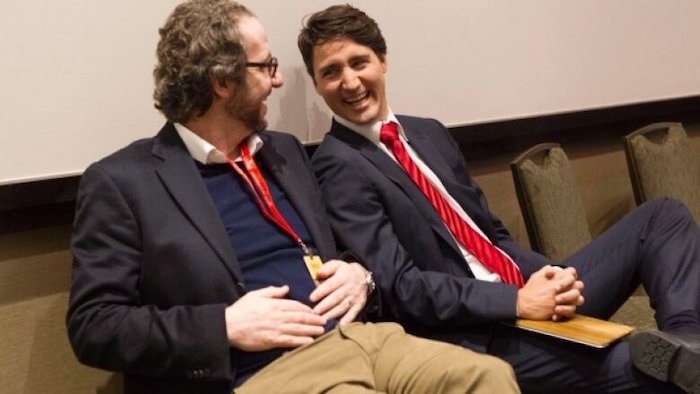National
Explosive New RCMP Transcript Renews Spotlight on Trudeau, Butts, Telford—Powers Behind Mark Carney’s Leadership Bid

 Sam Cooper
Sam Cooper
Wilson-Raybould asked by RCMP: ‘Did you advise Mr. BUTTS at one point that all this interference could amount at one point to an unlawful act?”
Despite controversial redactions that, according to a transparency advocate, may be inappropriately shielding Justin Trudeau’s inner circle from obstruction of justice accusations, newly released Royal Canadian Mounted Police transcripts provide unprecedented insight into the intense pressure campaign aimed at Jody Wilson-Raybould’s office to obstruct the prosecution of a major Quebec corporation closely tied to Trudeau’s government, his Montreal riding, and the Liberal Party’s re-election hopes.
These newly revealed RCMP interview records, though more than four years old, cast a fresh spotlight on Trudeau’s senior aides—several of whom, including Trudeau’s close friend Gerald Butts, have reportedly thrown their weight behind Mark Carney, the Liberal leadership frontrunner who appears poised to succeed Trudeau.
In a stunning revelation, RCMP records indicate that Wilson-Raybould warned Trudeau’s then-Principal Secretary, Gerald Butts, about her concerns regarding the unlawful nature of the pressure campaign.

As previously reported by The Bureau, Duff Conacher, co-founder of Democracy Watch—which obtained the records—commented:
“The Prime Minister and Cabinet officials pressuring the Attorney General to obstruct a prosecution is a situation that has not been publicly revealed before. Given that no past court ruling makes it clear the RCMP could not win a prosecution, a fully independent special prosecutor should have been appointed to pursue a search warrant for secret Cabinet communications.”
Documents obtained through access-to-information requests from Democracy Watch detail how Jessica Prince, Chief of Staff to then-Attorney General Wilson-Raybould, faced repeated, coordinated, and escalating demands from senior Trudeau officials to persuade Wilson-Raybould to override her prosecutors’ decision and cut SNC-Lavalin a deal.
What began as a single call from Finance Minister Bill Morneau’s office in August 2018 spiraled into months of pressure, involving some of the most powerful figures in Trudeau’s inner circle, including:
- Ben Chin, Chief of Staff to Finance Minister Bill Morneau
- Elder Marques & Mathieu Bouchard, Senior Advisors in the Prime Minister’s Office
- Gerald Butts, Trudeau’s Principal Secretary
- Katie Telford, Trudeau’s Chief of Staff
- Michael Wernick, Clerk of the Privy Council
SNC-Lavalin, one of Quebec’s largest engineering and construction firms, was charged in 2015 with fraud and corruption over alleged bribes to Libyan officials. In 2018, the Director of Public Prosecutions refused to offer SNC-Lavalin a Deferred Prosecution Agreement, prompting intense lobbying efforts by senior Trudeau officials.
Prince was first approached by Ben Chin in mid-August 2018.
“The case wasn’t on my radar at all,” Prince told an RCMP investigator. “The Public Prosecution Service is independent and handles tons of cases. We weren’t on top of all of them because the Department of Justice has about 45,000 pieces of litigation of its own. This was not high on my list of priorities.”
She recalled the abruptness of Chin’s outreach.
“He had clearly been speaking—I don’t know to whom—but to somebody at SNC-Lavalin, presumably someone quite high up, and was asking questions about the status of their prosecution.”
Prince described Chin as relentless, continuing to press her even as she tried to deflect.
“Francois was acting as Chief of Staff in my absence, so whenever people were trying to get a hold of me, I’d push them off to Francois. But Ben wouldn’t take no for an answer. He was like, ‘No, I really need to speak to you; I can’t speak to Francois.’”
Despite Prince’s repeated explanations about prosecutorial independence, Chin kept pushing. At one point, he insisted there had to be “a middle ground”—a compromise that would spare SNC-Lavalin from a criminal conviction.
Prince stood firm:
“There is no middle ground on prosecutorial independence, Ben. Like, you can’t. There’s not. It’s independent, you can’t, you can’t touch it.”
The next day, Bill Morneau’s office followed up, this time through Deputy Chief of Staff Justin To, whom Prince described as “Ben’s number two” and a former Prime Minister’s Office staffer.
One of the most explosive allegations from Jessica Prince’s RCMP interview involves her accusations of interference to Mathieu Bouchard, a Senior Advisor in the Prime Minister’s Office.
In October 2018, Prince received a call from Bouchard regarding a note prepared by the Deputy Attorney General. The note examined the relationship between the Attorney General and the Public Prosecution Service of Canada and included a controversial option: obtaining an external legal opinion on whether the Director of Public Prosecutions’ decision to deny SNC-Lavalin a Deferred Prosecution Agreement was appropriate.
Prince described Bouchard as persistent, pressing for ways to circumvent the Director of Public Prosecutions’ decision.
During the call, Prince accused Bouchard of interference:
“Look, Mathieu, this is… this is interference, right? Like this is, uh, to say we’re getting an external legal opinion, like, to what end, right? Like, if we think that the Director is exercising her discretion appropriately, why are we getting an external legal opinion, right?”
She pushed back on the implications of his request. Bouchard responded by tying the decision to the political stakes in Quebec, warning that SNC-Lavalin could pull its headquarters from the province.
“He said, ‘You know, Jess, we could have the best policy in the world, but if we… we have to get re-elected, right?’”
According to Prince, the intensity of pressure culminated in a meeting with Katie Telford and Gerry Butts on December 17, 2018. Prince emphasized how extraordinary the meeting was, saying, ‘It was incredibly rare that I would even have a phone call with Gerry or Katie, let alone be summoned to their office. So, I knew it wasn’t good.’ She noted how ‘the Chief of Staff of the Prime Minister is like, effectively the boss to all the chiefs of staff of the ministers’ offices.’
 Katie Telford
Katie TelfordAfter the meeting, Prince took detailed handwritten notes and sent a text to the Minister, Jody Wilson-Raybould, informing her of everything that had happened.
In her own subsequent interview with RCMP, according to the records, Wilson-Raybould was asked: “We’re in December now, so there’s quite a bit of meetings that took place before that. Did you advise Mr. Butts at one point that all this interference could amount at one point to an unlawful act?”
“I met Gerry at the Chateau,” the former Attorney General answered, “[and] we talk about a bunch of things, and there was a list of things that I wanted to bring up at the end which, is what I did and reflecting to him the nature of the number of discussions that I’ve had and it’s simply inappropriate.”
Meanwhile, the documents say around the time of that meeting, Prince learned that Michael Wernick, the Clerk of the Privy Council, was also involved in the pressure campaign. According to Prince, Wernick spoke to Wilson-Raybould and made it clear that the Prime Minister was growing increasingly agitated over her refusal to intervene. Prince recounted that Wernick said, ‘I don’t want the Attorney General and the Prime Minister to be at loggerheads on this… he’s in a real mood.’
The rest of Prince’s interview reads like the dénouement of a play, as she describes both herself and the Attorney General refusing to be shuffled to other posts, with both believing their functions had been interfered with from the highest levels, to benefit Trudeau’s re-election chances. After hearing Prince’s chronological narrative, the RCMP investigator pressed her on Ben Chin’s relationship with SNC-Lavalin.
“At one point… did Mr. Chin really indicate exactly what he meant by keeping that relationship positive with SNC-LAVALIN?”
Prince responded:
“I had the impression that he had been talking with somebody pretty senior at the company… he was clearly speaking to people high up in the company.”
The scandal broke in early 2019 when Wilson-Raybould resigned from Cabinet, followed by Treasury Board President Jane Philpott. Trudeau weathered the political storm but suffered the loss of a majority government in the October 2019 federal election.
The Bureau is a reader-supported publication.
To receive new posts and support my work, consider becoming a free or paid subscriber.
2025 Federal Election
Will Four More Years Of Liberals Prove The West’s Tipping Point?

The 1997 political comedy Wag The Dog featured a ruling president far behind in the polls engaging Hollywood to rescue his failing ratings. By inventing a fake war against Albania and a left-behind “hero”— nicknamed Shoe— the Hollywood producer creates a narrative that sweeps the nation.
The meme of hanging old shoes from the branches of trees and power lines catches on and re-elects the president. In a plot kicker, the vain producer is killed by the president’s handlers when he refuses to stay quiet about his handiwork. The movie’s cynicism over political spin made it a big hit in the Bill Clinton/ Monica Lewinsky days.

In the recent 2024 election the Democrats thought they’d resurrect the WTD formula to spin off senile Joe Biden at the last minute in favour of Kamala Harris. Americans saw through the obvious charade and installed Donald Trump instead.
You’d think that would be enough to dissuade Canadians who pride themselves on their hip, postmodern humour. But you’d be wrong, they don’t get the joke. Wag The Carney is the current political theatre as Liberals bury the reviled Justin Trudeau and pivot to Mark Carney. If you believe the polling it might just be working on a public besotted by ex-pat Mike Myers and “Canada’s Not For Sale”.
As opposed to Wag The Dog, few are laughing about this performative theatre, however. There are still two debates (English/ French) and over three more weeks of campaign where anything— hello Paul Chiang—can happen. But with Laurentian media bribed by the Libs— Carney is threatening those who stray— people are already projecting what another four years of Liberals in office will mean.
As the most prominent outlier to Team Canada’s “we will fight them on the beaches…” Alberta’s premier Danielle Smith is already steering a course for her province that doesn’t include going to war with America on energy. She asked Trump to delay his tariffs until Canadians had a chance to speak on the subject in an election April 28. Naturally the howler monkeys of the Left accused her of treason. She got her wish Wednesday when Canada was spared any new tariffs for the time being.

Clearly, she (and Saskatchewan premier Scott Moe) have no illusions about Carney not using their energy industry as a whipping post for his EU climate schemes. They’ve seen the cynical flip in polls as former Trudeau loyalists hurry back to the same Liberal party they abandoned in 2024. They know Carney can manipulate the Boomer demographic just as he did when he called for draconian financial methods against the peaceful Truckers Convoy in 2022.
Former Reform leader Preston Manning is unequivocal: “’Large numbers of Westerners simply will not stand for another four years of Liberal government, no matter who leads it.’“ So how does the West respond within Confederation to protect itself from a predatory Ottawa elite?
Clearly, the emissions cap— part of Carney’s radical environmental plans— will keep Alberta’s treasure in the ground. With Carney repeating no cancellation of Bill C-69 that precludes building pipelines in the future, the momentum for a referendum in Alberta will only grow. The NDP will howl, but there will be enough push among from the rest of Albertans for a new approach within Canada.
In this vein Smith even wants to approach Quebec. While it seems like odd bedfellows the two provinces most at odds with the status quo have much in common . “This is an area where our two provinces may be able to coordinate an approach,” Smith wrote this week. That could include referendums by the middle of 2026.
Perhaps the best recipe for keeping the increasingly fractious union together is a devolution of power, not unlike that governing the United Kingdom. While Westminster remains the central power since 1997, there are now separate parliaments in Scotland, Wales and Northern Ireland that put power closer to the citizen, so that local factors are better recognized in decision making.
With so little uniting the regions of the country any longer, devolution might provide a solution. What form could decentralization take within Canada? A Western Canada Parliament could blunt predatory federal energy policies while countering the imbalances of Canada’s equalization process. Similar parliaments representing Quebec, the Atlantic provinces, Ontario and B.C. would protect their own special interests within Canada. Ottawa could handle Canada’s international obligations to defence, trade and international cooperation.
While the idea is fraught with pitfalls it nonetheless remains preferable to a breakup of the nation, which four more years of Liberals rule under Mark Carney and the same Trudeau characters will likely precipitate. Smith’s outreach case would be the beginning of such a process.
None of this would be necessary were the populations of Eastern Canada and B.C.’s lower mainland remotely serious after snoozing through the Trudeau decade. The OECD shows Canada’s 1.4% GDP barely ahead of Luxembourg and behind the rest of the industrialized world from 2015-2025. As we’ve said before the Boomers sitting on their $1 million-plus homes are re-staging Woodstock on the Canada Pension and OAS. As with Wag The Dog, they’re not getting the joke.

When the Boomers award themselves another four years of taxapalooza and Mike Myers and the other “Canada Not For For Sale” celebs head south to their tax-avoidance schemes how will the Boomers say they’ve left Canada better off for anyone under 60? We’ll hang up and listen to your answer on the TV.
Bruce Dowbiggin @dowbboy is the editor of Not The Public Broadcaster A two-time winner of the Gemini Award as Canada’s top television sports broadcaster, his new book Deal With It: The Trades That Stunned The NHL And Changed hockey is now available on Amazon. Inexact Science: The Six Most Compelling Draft Years In NHL History, his previous book with his son Evan, was voted the seventh-best professional hockey book of all time by bookauthority.org . His 2004 book Money Players was voted sixth best on the same list, and is available via brucedowbigginbooks.ca.
2025 Federal Election
Highly touted policies the Liberal government didn’t actually implement

From The Audit
State capacity is the measure of a government’s ability to get stuff done that benefits its population. There are many ways to quantify state capacity, including GDP per capita spent on health, education, and infrastructure versus outcomes; the tax-to-GDP ratio; judicial independence; enforcement of contracts; and crime rates.
But a government’s ability to actually implement its own policies has got to rank pretty high here, too. All the best intentions are worthless if, as I wrote in the context of the Liberal’s 2023 national action plan to end gender-based violence, your legislation just won’t work in the real world.
The Audit is a reader-supported publication.
To receive new posts and support my work, consider becoming a free or paid subscriber.
So I thought I’d take a look at some examples of federal legislation from the past ten years that passed through Parliament but, for one reason or another, failed to do its job. We may agree or disagree with goals driving the various initiatives, but government’s failure to get the work done over and over again speaks to a striking lack of state capacity.
The 2018 Cannabis Act (Bill C-45). C-45 legalized recreational cannabis in Canada, with a larger goal of regulating production, distribution, and consumption while reducing illegal markets and protecting public health. However, research has shown that illegal sales persisted post-legalization due to high legal prices and taxation. Studies have also shown continued use among children despite regulations. And there are troubling indicators about the overall impact on public health.
The 2021 Canadian Net-Zero Emissions Accountability Act (Bill C-12). The legislation aimed to ensure Canada achieves net-zero greenhouse gas emissions by 2050 by setting five-year targets and requiring emissions reduction plans. However, critics argue it lacks enforceable mechanisms to guarantee results. A much-delayed progress report highlighted a lack of action and actual emissions reductions lagging far behind projections.
The First Nations Clean Water Act (Bill C-61) was introduced in late 2024 but, as of the recent dissolution of Parliament, not yet passed. This should be seen in the context of the Safe Drinking Water for First Nations Act (2013), which was repealed in 2021 after failing to deliver promised improvements in water quality due to inadequate funding and enforcement. The new bill aimed to address these shortcomings, but a decade and a half of inaction speaks to a special level of public impotence.
The 2019 Impact Assessment Act (Bill C-69). Passed in 2019, this legislation reformed environmental assessment processes for major projects. Many argue it failed to achieve its dual goals of streamlining approvals while enhancing environmental protection. Industry groups claim it created regulatory uncertainty (to put it mildly), while environmental groups argue it hasn’t adequately protected ecosystems. No one seems happy with this one.
The 2019 Firearms Act (Bill C-71). Parts of this firearms legislation were delayed in implementation, particularly the point-of-sale record keeping requirements for non-restricted firearms. Some provisions weren’t fully implemented until years after passage.
The 2013 First Nations Financial Transparency Act. – This legislation, while technically implemented, was not fully enforced after 2015 when the Liberal government stopped penalizing First Nations that didn’t comply with its financial disclosure requirements.
The 2019 National Housing Strategy Act. From the historical perspective of six years of hindsight, the law has manifestly failed to meaningfully address Canada’s housing affordability crisis. Housing prices and homelessness have continued their rise in major urban centers.
The 2019 Indigenous Languages Act (Bill C-91). Many Indigenous advocates have argued the funding and mechanisms have been insufficient to achieve its goal of revitalizing endangered Indigenous languages.
The 2007 Public Servants Disclosure Protection Act (PSDPA). Designed to protect whistleblowers within the federal public service, the PSDPA has been criticized for its ineffectiveness. During its first three years, the Office of the Public Sector Integrity Commissioner (OPSIC) astonishingly reported no findings of wrongdoing or reprisal, despite numerous submissions. A 2017 review by the Standing Committee on Government Operations and Estimates recommended significant reforms, but there’s been no visible progress.
There were, of course, many bills from the past ten years that were fully implemented.¹ But the failure rate is high enough that I’d argue it should be taken into account when measuring our state capacity.
Still, as a friend once noted, there’s a silver lining to all this: the one thing more frightening than an inefficient and ineffective government is an efficient and effective government. So there’s that.
The fact that we’re still living through the tail end of a massive bout of inflation provides clear testimony that Bill C-13 (COVID-19 Emergency Response Act) had an impact.
For the full experience, upgrade your subscription.
-

 Crime2 days ago
Crime2 days agoFirst Good Battlefield News From Trump’s Global War on Fentanyl
-

 2025 Federal Election1 day ago
2025 Federal Election1 day agoWEF video shows Mark Carney pushing financial ‘revolution’ based on ‘net zero’ goals
-

 Break The Needle1 day ago
Break The Needle1 day agoWhy psychedelic therapy is stuck in the waiting room
-

 2025 Federal Election1 day ago
2025 Federal Election1 day agoThree cheers for Poilievre’s alcohol tax cut
-

 2025 Federal Election1 day ago
2025 Federal Election1 day agoMORE OF THE SAME: Mark Carney Admits He Will Not Repeal the Liberal’s Bill C-69 – The ‘No Pipelines’ Bill
-

 2025 Federal Election1 day ago
2025 Federal Election1 day ago‘Coordinated and Alarming’: Allegations of Chinese Voter Suppression in 2021 Race That Flipped Toronto Riding to Liberals and Paul Chiang
-

 Opinion2 days ago
Opinion2 days agoSome scientists advocate creating human bodies for ‘spare parts.’
-

 2025 Federal Election1 day ago
2025 Federal Election1 day ago‘I’m Cautiously Optimistic’: Doug Ford Strongly Recommends Canada ‘Not To Retaliate’ Against Trump’s Tariffs











